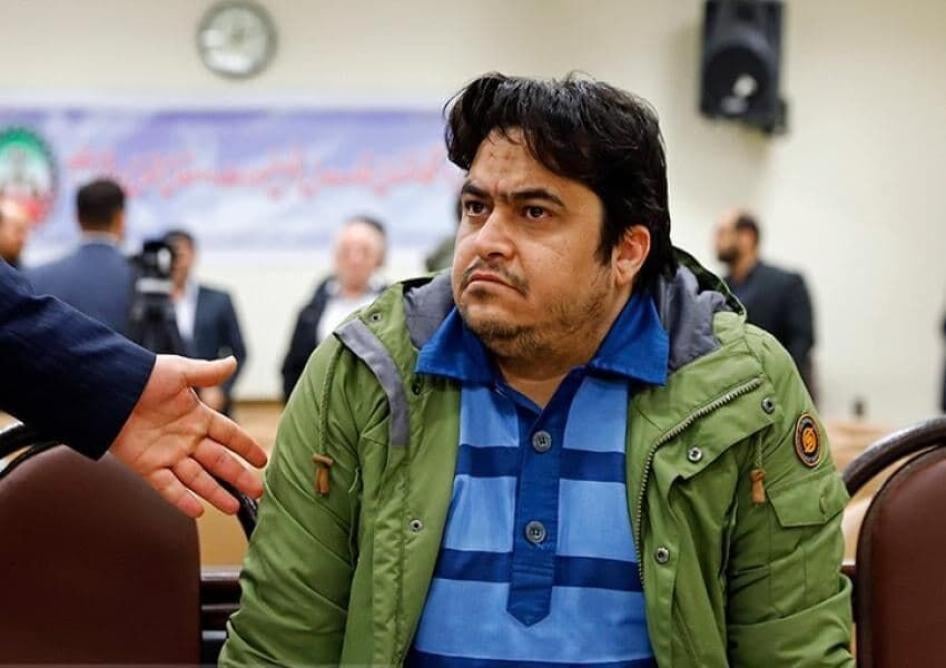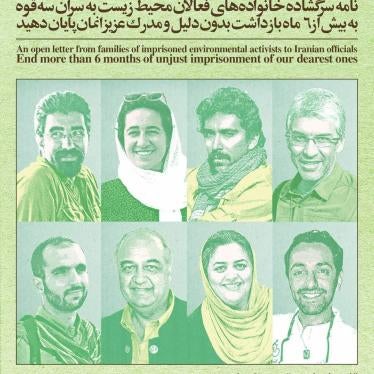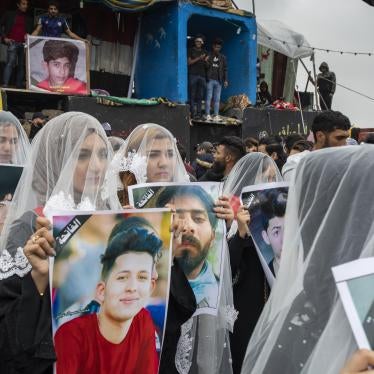(Beirut) – Iranian authorities executed a prominent dissident and journalist on December 12, 2020, after convicting him on vague national security charges, Human Rights Watch said today. Rouhallah Zam, founder of the popular Telegram channel Amadnews, was likely detained while on a visit to Iraq in October 2019 and forcibly returned to Iran, where he faced trial for his activism. The Supreme Court of Iran upheld the verdict on December 8.
On December 12, Tehran’s Public and Revolutionary Prosecutor’s Office said that authorities executed Zam, 42, following conviction on charges including “sowing corruption on earth,” a vague charge used by Iranian authorities against political dissidents. Zam faced a total of 17 charges, including establishing Amadnews to disrupt national security, spying for French and Israeli intelligence authorities, and collusion to act against national security. Zam’s father wrote on social media that his son did not know his verdict had been upheld during their last visit with him the day before the execution.
“The execution of Rouhollah Zam shows the extent to which Iran has weaponized the cruel and inhumane use of the death penalty as a tool of repression,” said Tara Sepehri Far, Iran researcher at Human Rights Watch. “Fair trial and due process are essential for defendants in all cases, but in death penalty cases their absence renders any proceedings a travesty of justice.”
On December 8, Gholamhossein Esmaili, the judiciary’s spokesperson, announced that Iran’s Supreme Court upheld the death sentence against Zam. On December 12, Zam’s father, Mohammad Ali Zam, a former government official, wrote on his Instagram account that Rouhollah’s case officer at the Revolutionary Guards Corps Intelligence Organization told the family on December 11 that they could visit him in prison but were not allowed to tell him that his sentence had been upheld. Zam’s father said in July that authorities prevented Rouhollah’s public defender from meeting with his client in private. He said that authorities also prevented his son from communicating with his wife and daughter, who live in France, or his parents in Iran, since his arrest.
On two separate occasions, on July 10 and December 10, the Islamic Republic Broadcasting Agency (IRIB) broadcasted Zam’s “confession.” Iran’s government-run Islamic Republic of Iran Broadcasting (IRIB) has a long history of parading Iran’s critics and their family members on national TV, where they are forced to make so-called “confessions” or public statements meant to discredit them and their causes. Human rights groups have documented several instances in which dissidents, activists, and journalists were featured in pseudo-documentary videos intended to “prove” their “guilt,” though they apparently did not appear willingly.
On October 14, 2019, Iran’s Revolutionary Guard Corps Intelligence Organization issued a statement saying that it had arrested Zam, who had been living in exile in Paris. The statement did not specify where he was arrested, but sources with close knowledge of the case told Human Rights Watch that he was likely arrested in Iraq and transferred to Iran.
Amadnews became one of the most popular sources of information for Iranians during the widespread protests that took place in December 2017 and January 2018. During that time, Pavel Durov, the CEO of Telegram, a popular messaging application, announced that Telegram had suspended the Amadnews channel for allegedly instructing subscribers to use Molotov cocktails against the police.
Human Rights Watch opposes the death penalty in all circumstances because it is inherently cruel and irreversible. Iran has one of the highest rates of the death penalty in the world. Over the past year, authorities executed without due process two other people on the charge of murdering security officials. Over the past three years, authorities have cracked down against widespread anti-government protests with excessive and lethal force, and failed to conduct any transparent investigation into these serious abuses committed by security forces.
Under international human rights law, everyone has the right to freedom of expression and peaceful assembly as provided under the International Covenant on Civil and Political Rights (ICCPR), to which Iran is a party.
Article 6 of the ICCPR states that, “In countries which have not abolished the death penalty, a sentence of death may be imposed only for the most serious crimes in accordance with the law in force at the time of the commission of the crime.” Under international law, “most serious” crimes are typically those that result in the death of others. The Human Rights Committee, which authoritatively interprets the covenant, has said that the death penalty should be a “quite exceptional measure.”
International law guarantees anyone accused of a crime access to a lawyer at all stages of criminal proceedings, including during the investigation, the pretrial proceedings, and during the trial itself. Under Article 1 of the UN basic principles on the role of a lawyer, “All persons are entitled to call upon the assistance of a lawyer of their choice to protect and establish their rights and to defend them in all stages of criminal proceedings.”
As a party to the United Nations Convention against Torture and Other Cruel, Inhuman or Degrading Treatment or Punishment, Iraq has a treaty obligation not to return anyone to a territory where they face a real risk of torture or ill-treatment.
“The world should not turn a blind eye to Iran’s continuing blatant violations of human rights,” Sepehri Far said. “Iraqi authorities should also immediately clarify whether its security forces enabled this abuse by arresting and returning Zam to Iran.”
Iran: Dissident Executed on Vague Charges
Conviction Came After Tainted Confession
Correction
The date of Zam's arrest statement was updated to October 14, 2019.
Your tax deductible gift can help stop human rights violations and save lives around the world.
Region / Country
Topic
Most Viewed
-
April 17, 2024
West Bank: Israel Responsible for Rising Settler Violence

-
November 25, 2019
A Dirty Investment

-
April 27, 2021
A Threshold Crossed

-
June 24, 2022
Q&A: Access to Abortion is a Human Right

-
June 21, 2017
“Just Let Us Be”





